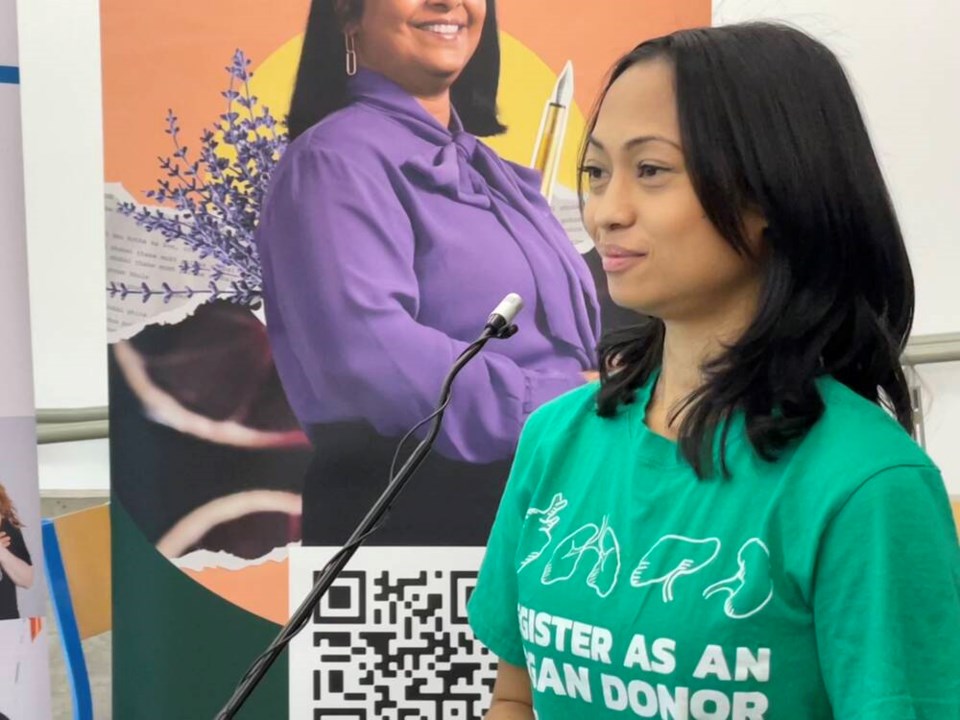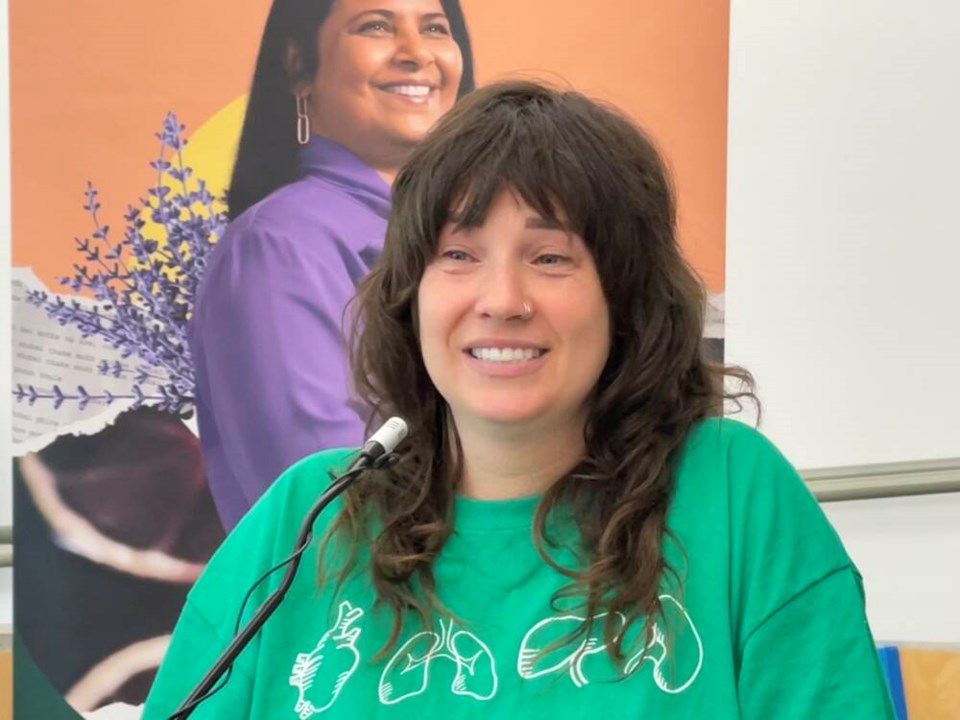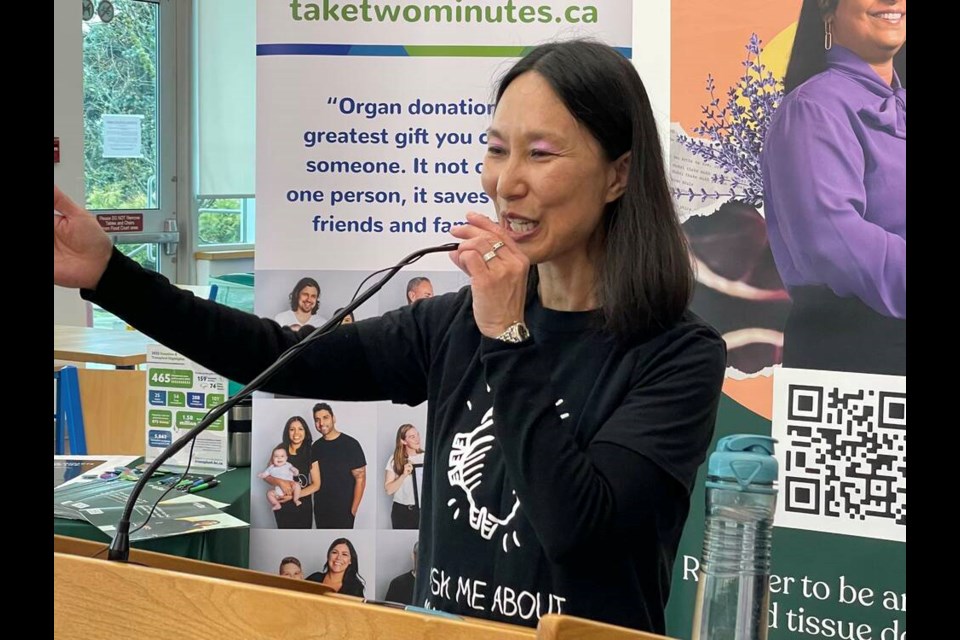Before she received her heart transplant in 2002, Carrie Jung had been sick for seven years and knew that she was dying.
Walking up a flight of stairs, carrying a bag of groceries, washing her hair in the shower – these had all become progressively harder, the Capilano University professor said.
Other activities that used to bring her joy – dancing, rollerblading, skiing – had completely disappeared from her life as her heart condition worsened.
Jung and her doctors had tried other medications and procedures in the hopes they would help. But her heart condition worsened. Eventually her cardiologist told her there was nothing further they could do, and she needed to agree to a heart transplant. Making the decision gave her an immense sense of relief, said Jung. “As if finally I had decided to live again.”
A little over a year later, in 2002, she got the phone call late at night – a heart had become available for her.
On Thursday, Jung and several other organ donor recipients shared their stories at Capilano University’s North Vancouver campus to raise awareness of organ donation and encourage others to register. The event was held on Green Shirt Day – which commemorates the legacy of Logan Boulet, a young man who died in the Humboldt Broncos bus tragedy of April 2018. It also marked a local kick off to Organ Donation Awareness Month.
In Jung’s case, however, the life-changing surgery was just one part of her journey.
20-year friendship between recipient, donor family
After receiving her heart and being able to resume much of the life she’d put on hold, Jung felt compelled to write to the family of her donor to thank them for their gift. That began an extraordinary correspondence between Jung and Marie Doherty, the mother of the 37-year-old man named Darcy whose heart she had received.
When they began writing to each other, neither woman knew the other’s name.
They would write each other with news about their lives, and at special occasions, several times a year, said Jung. At the time, direct correspondence wasn’t allowed by BC Transplant, so all letters were anonymous, and had to go through the transplant agency. She addressed her letters to “my other mom” and signed her letters with a heart.
“I kept every one of her letters and she kept mine,” said Marie Doherty.
But in November 2019, BC Transplant expanded the way donor families and adult recipients could contact each other, allowing for face-to-face meetings if both parties agree.
For Jung and the Doherty family, including Marie and Darcy’s older brother Daryl, that emotional meeting took place in February 2020.
“When we finally met, it was as if we had known each other all our lives already,” said Jung.
On Thursday, the Doherty family was also present at CapU to lend their support to Green Shirt Day.
Daryl remembered speaking with his brother Darcy about an organ donor campaign that was running at the time. It was only two months later when out of the blue, Darcy was rushed to hospital in Maple Ridge after suffering a burst brain aneurysm.
Meeting Jung and knowing she got a second chance at life has helped them take some meaning from their own loss, said Daryl.
Other organ donor families and recipients were also on hand at CapU’s Green Shirt Day Thursday.
Heart and liver recipients voice gratitude
They included , who was a second-year university student and an “average, normal person” when she developed inflammation of the heart after getting sick with the flu two years ago. Within three weeks of getting sick, “I was in heart failure,” she said. A transplant saved her life. Three years later, Lee has been accepted into nursing school.

Joanne Arcado was also just 21 went she was diagnosed with an autoimmune disease that caused her body to attack her own organs, including her liver.
By the time she was 27, “I was dying,” she said. “I had very, very yellow skin, very yellow eyes. I had a very protruding big belly because it was all full of fluid. My other organs were shutting down. And I needed blood transfusions to keep me alive.”
As soon as she got her transplant, she was able to do normal activities, like drive again, and within two months was able to travel, she said.
Arcado’s best friend , when her sister Madeline became a donor after being killed in a car accident in 2019 at 23.
“I think about her all the time,” said Winnig. “I’m so grateful other people have a piece of her. It’s still a little bit astonishing to me.”
Some organ donors are even able to donate while they are alive.
‘What would I do?’
after reading a plea on Facebook from an old high school friend whose wife needed a match for a kidney.
After thinking about it, for Hiebert the key question was “What would I do?” in a similar position, she said.
Hiebert wasn’t a match for her high school friend’s wife, but ended up donating through a paired matching system, in which her kidney went to another woman, but her friend’s wife received a different kidney.
Hiebert said she’s since met her recipient, the mom of a teenager at the time.

Residents urged to register as organ donors
According to BC Transplant, the provincial health agency which oversees organ transplants in B.C., there were 465 transplants performed in the province in 2022, including 288 kidney transplants, 101 liver transplants, 54 lung transplants and 25 heart transplants. Those donations came from 159 donors who died, as well as 74 living kidney donors.
Only people who die in very specific circumstances – usually in a hospital Intensive Care Unit on a ventilator – can become donors, and then only if they are a match.
According to BC Transplant, often makes it easier for family members to honour that decision.


